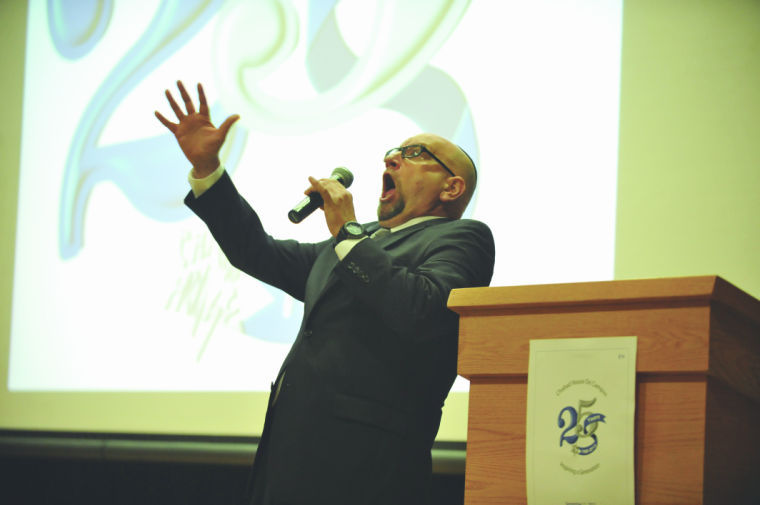Rabbi discusses viral video at Chabad reunion
September 12, 2013
For rabbi David Nesenoff, one viral YouTube video sparked a slew of death threats.
On Wednesday night, Nesenoff recounted his story before 200 members of the local and college community to commemorate the 25th family reunion of the Pittsburgh Chabad House. Shmuel Weinstein and his wife started the Chabad House in Oakland a quarter of a century ago in hopes to unite Jewish students through programs and services.
This year, the event’s theme was “inspiring a generation.” The Chabad House invited Nesenoff, a rabbi and filmmaker, to speak to the audience about his encounters with anti-Semitism and the attention he received over his viral online video, which featured Helen Thomas, a previous member of the White House press corp.
One day in May of 2010, Nesenoff recalled, he decided to compile video snippets about comments on Israel.
“Israel was on my mind, and I felt so bad. Everyone’s always beating her up — my poor Israel,” he said.
After Nesenoff’s son had managed to receive press passes for both to attend the May 2010 Jewish Heritage Day at the White House, Nesenoff decided that it would be a good place to ask for comments about Israel.
In addition to the high-profile political figures they saw during their visit, including Bill Clinton and Joe Biden, Nesenoff recognized journalist Helen Thomas.
Taking the opportunity to begin his project, Nesenoff asked Thomas on camera if she had any comments on Israel, to which she responded, “Tell them to get the hell out of Palestine.”
Nesenoff said that he knew he had to do something with the controversial statement that he had just recorded.
“I thought I should do something with it, put it online,” he said.
Two days after he uploaded the video to YouTube, Nesenoff said that it had received over 700,000 hits.
He described a constant stream of thousands of email messages coming in each second.
In addition to the video’s views, Nesenoff said that he additionally received between 25,000 and 30,000 death threats. He spoke of living in a home where he had to keep the windows closed and having to be trained on how to leave his house.
“Everyone in the world wanted to know who the guy was behind the camera,” he said.
Before Nesenoff recounted his surge to YouTube stardom, Weinstein spoke about the progress the Chabad House has seen since its founding 25 years ago. Since the first house’s arrival, Chabad Houses have extended to reach eight campuses throughout the city.
“Each student becomes a part of our family,” Weinstein said. “Whether it is a listening ear or a hot bowl of soup, the bond between us and the students is deep and everlasting.”
Ben Dynan, a Pitt senior who served as president of the Chabad House in 2012, agreed that the relationships formed through the group are strong. He said that many alumni will return to campus for events such as this.
“It’s exciting to see people that were here decades ago — that were involved in the past and the present,” he said.
Dynan emphasized that the anniversary was particularly significant because of the group’s age.
“Not many houses have that kind of seniority,” he said.
During his story, Nesenoff said that he decided to call on Jewish-American professor and author Eliezer “Elie” Wiesel for advice on how to cope with the negative reactions to his YouTube video. Wiesel, a Nobel Peace Prize-winning laureate, is the author of the famous “Night” trilogy, which details his experiences as a prisoner in numerous concentration camps during the Holocaust.
Nesenoff passed Weisel’s message down to his audience.
“We are not the friends of Israel, we are the children of Israel. Sometimes the children are away, but the land of Israel is their home,” he recounted. “It’s God-given. They exist because of each other. … This woman [Thomas], and people like her, have no [such] relationship.”



